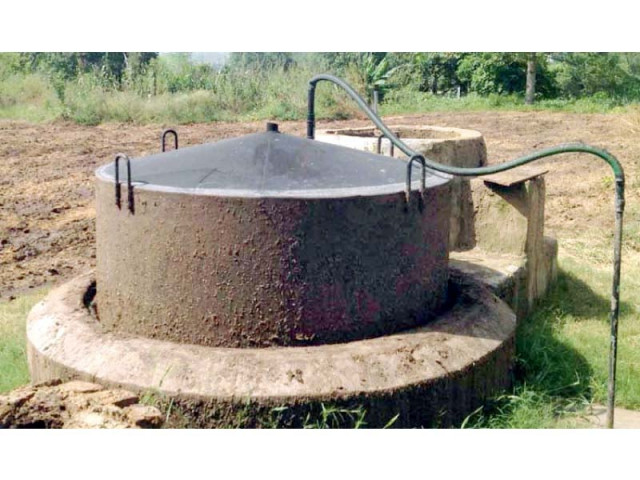Biogas – the future of Punjab’s energy needs
Commodity effectively able to replace conventional cooking fuels in rural areas

PHOTO: FILE
These observations were confirmed through the use of biogas plants in the suburbs of Lahore. These findings were unearthed in a recently published research paper on socioeconomic, health and agriculture benefits of rural household biogas plants in energy-scarce and developing countries.
Energy allocation at Rs16.1b, but 93% to be spent on clearing pending dues
Published in the International journal of Renewable Energy, the research was conducted by Abdullah Yasar, Saba Nazir, Amtul Bari Tabinda, Masooma Nazar, Rizwan Rasheed and Muhammad Afzaal from Sustainable Development Study Centre of GC University Lahore.
The research presents a case study from Pakistan with the sample population from suburbs and slums of Lahore including villages like Jallo, Bedian, Mehmood boti, Mandiawala, Jia Bagga, Ghanikey, Mouza Korian Barki, Mouza Opal Barki, Guru Manget, Mouza Pathankey and suburbs of Faisalabad like Ganga Singh, Ram Diwali and Mamunkanja.
The study is based on the premise of the huge biogas potential that an energy-starved country like Pakistan needs to explore. According to the research, Pakistan's livestock accounts for 159 million animals which create nearly 652 million kilogrammes of manure on a daily basis. This could have the potential of 16.3 million cubic metres of biogas daily and 20 million tonnes of fertiliser per annum.
Windfall for Chinese on coal fired projects
A questionnaire-based survey was conducted to focus on factors such as adequacy of energy supply, source of energy before installation of biogas plant, difficulty in supply and main use of biogas. As many as 80% of the respondents were facing problems of energy resources and only 20% were accessing them easily before the installation of biogas plants.
It was established that biogas was effectively able to replace conventional cooking fuel in rural areas of the country due to the abundance of raw material. Overall, after the installation of a bio digester, a healthy indoor environment lessened incidence of disease and reduced workload as well expenses of energy. At the same time, biogas would usher in better sanitary conditions and save time that can be used to engage in other income generating activities.
A detailed result of the survey in the sample area revealed that biogas technology was mostly adopted by large families of between 12 and 15 members.
Through the use of biogas, 46.7% of women reported securing benefits such as saving up to three hours of cooking time, while 23.3% male members reported getting economic benefits from installation and usage of biogas plant.
Respondents also reported saving money and earning 16.7% more as they were involved on income-generating tasks. They added there was also a 13% reduction in their workload.
The study revealed that agro-based community was depending heavily on fuel wood before the installation of biogas plants. After installing them, the commodity was allocated as the lone source of cooking and heating for 98% of the users. In addition, 85% users were employing slurry for agricultural input, rendering benefits by reducing expenses of chemical fertiliser and improving crop yield. Due to use of biogas as a cooking fuel, a monthly saving of around Rs480 can also be obtained.
Further results in the study revealed that energy scarcity, which is a hurdle in sustainable development, could be removed through clean and reliable energy sources like biogas. It can be used as the main component towards energy scarcity that is a serious concern for the nation. Through the use of biogas plant many social, health and economic benefits are obtained at the domestic level.
It was found that biogas had benefitted women more than men it reduced the burden of work due to the sharing of responsibilities.
However, a list of noticeable challenges also emerged in the study, such as the high investment cost for expansion and increased chances of plant failure after due to the lack of proper maintenance.
Published in The Express Tribune, September 16th, 2017.



















COMMENTS
Comments are moderated and generally will be posted if they are on-topic and not abusive.
For more information, please see our Comments FAQ